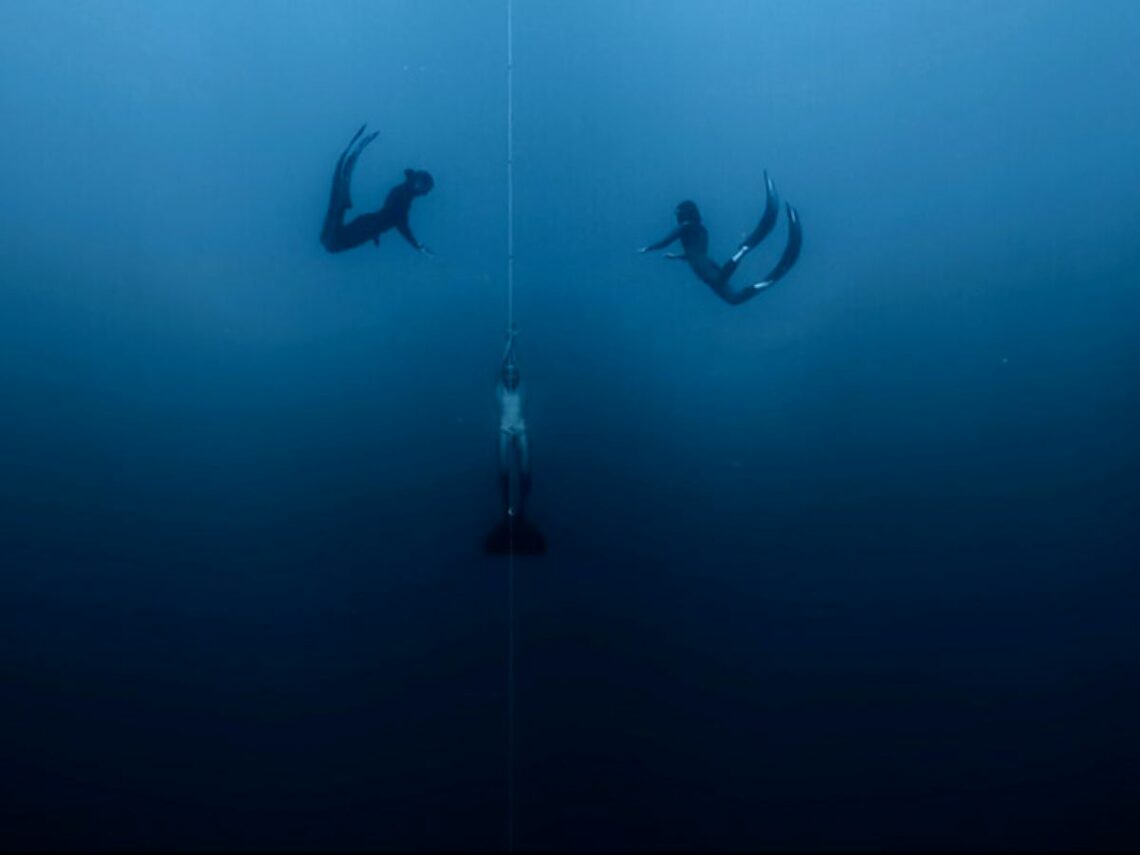Few documentaries have hit as hard as Netflix’s The Deepest Breath. Following the story of the Irish freedivers Stephen Keenan and Alessia Zecchini throughout their accomplishments, the doc centres perfectly on the tragedy behind Keenan’s death as he saved the life of his friend Zecchini.
The documentary doesn’t shy away from the dangers of such an extreme sport; many divers are shown experiencing blackouts often in the last ten seconds of their dives which, if not treated immediately, can leave a devastating or fatal impact. Free diving leaves little to no room for mistakes, as we see when Zecchini is training for a world-record attempt in the deepest dive.
Keenan’s story wasn’t the only one to end tragically. Another fatality that the documentary briefly mentions is that of Nicholas Mevoli. During the show, Mevoli is painted to be someone who’s passionate and ambitious when it comes to free diving but also someone who was known to push the boundaries of what was physically possible. After blacking out while resurfacing, the repercussions of such a deep dive proved to be too much for Mevoli, and the team on hand at the time “couldn’t save him”.
At the time, Mevoli was attempting to set an American record at the Vertical Blue competition in the Bahamas. Prior to diving, Melvoli worked in film and television on works like Gossip Girl and Chappelle’s Show. As a freediver, he won titles twice at the Deja Blue competition and finished third at the Caribbean Cup in Honduras. He also achieved an American record at the Caribbean Cup with a dive to 100 metres in the Constant Weight category (when the diver ascends and descends without pulling the rope).
On November 15th, 2013, Mevoli was attempting to reach a depth of 96 metres in the Free Immersion category (when the diver doesn’t use any propulsion equipment). At 80 metres, however, Mevoli turned back after suffering an upper respiratory squeeze. This is explained in The Deepest Breath as something that can be immediately fatal – occurring most commonly when the diver ascends or descends too quickly, not leaving the lungs enough time to adjust to the differences in pressure.
Mevoli survived, but two days later, when attempting a dive to 72 metres, the outcome would be very different. On his ascent, he began to turn back at 68 metres but changed his mind and dived downward again. After three minutes and 38 seconds underwater, Mevoli returned to the surface and gave the OK sign to signify that he was fine, but then fell backwards into the ocean and lost consciousness.
He was the first athlete to die in an international freediving competition, leaving a mark on the community at the time and renewed shock about the realities of extreme sports. Blacking out during a dive has almost become commonplace among divers – they have procedures in place that they’ve repeated time and time again – but fatalities are still completely unexpected.
Keenan was assisting Zecchini during her attempt at tackling the Blue Hole in 2017 when a succession of mistakes led to his unfortunate death. Zecchini had swum through the arch but couldn’t locate the rope where Keenan was waiting for her – in an effort to find her, Keenan prioritised Zecchini’s safety over his own and pushed her up to the surface. They both emerged in a blackout; Zecchini with her face out of the water, Keenan with his face down. She survived the dive, but he didn’t.
It all begs the question: are the achievements worth the risk? Zecchini’s dive through the Blue Hole severely lacked all kinds of safety protocols; they had no medical professionals on the scene, the timing was miscalculated, and she insisted on doing the dive without mono-fins, despite never having attempted it before.
In Mevoli’s case, obsession meant frustration whenever something went wrong, and so he pushed and pushed until it was too much. Many divers show the same level of self-criticism, which is when mistakes – and even death – can occur. Overall, it all seems to be a sport that has blurred the lines between skills and infatuation just a little too much.
